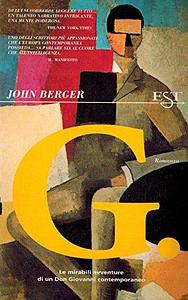Take a photo of a barcode or cover
you can have it. it's dumb. i hated it. what the hell? and the guy won the booker prize? did it just go directly over my head> maybe. it's still a bad book. on to bigger and better ones.
Interesting and in places really perceptive, I felt mostly disconnected from this and didn't get as much out of it as I thought I ought to.
Probably works better for some people than for me. Useful to read to see where Will Self got so much of his shtick in Umbrella.
Probably works better for some people than for me. Useful to read to see where Will Self got so much of his shtick in Umbrella.
“Luminous”? Booker prize worthy? No. Interesting enough but frankly, not all that that.
Stands up well - it is clear why it won the Booker prize. A story of empire and colonization and capital in the late 19th century, during the unification of Italy. Also the first flight over the Alps (1910) and the Boer destruction of civilisation in South Africa.
The author addresses the reader directly with his views on sexuality, politics and relationships, and the storyline is non-sequential.
An enjoyable read, and I am going on to read another of his
The author addresses the reader directly with his views on sexuality, politics and relationships, and the storyline is non-sequential.
An enjoyable read, and I am going on to read another of his
È molto imperfetto. Non supera il test di Bechdel-Wallace. Ahimè.
The sun is low in the sky and the sea is calm. The horizon is the straight bottom edge of a curtain arbitrarily and suddenly lowered upon a performance.
The sun is low in the sky and the sea is calm. The horizon is the straight bottom edge of a curtain arbitrarily and suddenly lowered upon a performance.
Although there are very many things to like, even love, about this very ambitious novel, I have to acknowledge that it fails at every turn. That is to say that, into each category you might want to put it (feminist novel, socialist novel, erotic novel, historical novel) it isn't as successful at epitomizing the category as many other novels in these categories--perhaps this is because it's so very ambitious. I guess the best way to describe it is as a Jack-of-all trades novel. Absolutely beautiful in parts, rather engrossing, and here and there wise, and quite vivid at times, it also fails to really be either feminist, critically political, wholly erotic, or to say anything very important about the political/historical moments it presents. It's a kind of wonderfully incomplete hodgepodge, like a failed microcosm proving Joyce's Ulysses wrong: you can't represent the whole through one of its pieces, the part is not the whole, and maybe there is no whole anyway, perhaps it's an illusion of Occidental thinking to even conceive of something called a whole that could be at once thought of and understood in all of its intricately intertwined wholeness.
I don't want this to sound wholly negative as there are many things to love about this novel. Even if inconclusive somehow as an historical novel, the evocation of a kind of modernized Henry Jamesian US expat in Europe and the Livorno, Milan on the last day of socialist revolution in Western Europe, rural English country estate, Switzerland as the first airplane attempts to cross the alps, London as WWI begins, and Trieste just as Italy enters the Great War, all during the three decades leading up to the day Italy declared war on Austria/Hungry and enters WWI, is quite interesting and informative. The evocation itself of these moments in these places--some inconsequential yet part of a larger European history, others important at the time but nearly forgotten, and still others perhaps newly interpreted by the novel, are lovely, yet the panorama is somehow incomplete, neither personal or political enough to really drive a point home with enough emotional force to wow this reader. I really enjoyed it, but it never quite knocked my socks off.
The erotic part and the PoMo Don Juan motif is also at times quite lucid and gives us a certain amount of poetry, yet, in the end, it seemed out of place next to the critical Marxist historical aspects of the narrative and didn't shed, to me anyway, any new light on the old story. If anything the Don Juan references seemed a little forced. Attached to these elements, the attempt to paint Don Juan as a kind of liberator of women is interesting--I should note here that the novel is dedicated to a woman and her "sisters in women's liberation"--and far-seeing. If women have been oppressed by having the sexuality oppressed then it does follow that a male lover might, through his approach to their sexuality, at least help women to free themselves by approaching sex in some new way. Yet I also have to say by focusing on a male protagonist liberating women by seducing them you shift the focus back to the eternal male actor/voice and, as usual, women take a back seat to their own stories. Again, nice try, interesting, but sadly unconvincing in the end.
Lastly the "political awakening" at the end, perhaps an attempt to make the socialist point of the novel, reads much more (and believably) as a personal gesture toward chaos and exhilaration than as any sort of political commitment. (This allows me the opportunity to say that I don't think any of these elements I'm criticizing are out of the author's control or mistakes. They're features of the novel, not bugs, hence my ability to critique them. Berger is clearly a master; I'm merely pointing out how these features of the novel struck this reader, a humble soul sadly saddled with his own opinions.) So, as a historical-political novel again the emotional punch of the personal awakening to a political stance (the end of Casablanca for instance) again just doesn't hit home as it might have.
Also, and really lastly this time, the tone of the novel is both fascinating, at times effective, but also often annoying. While I usually love a PoMo intrusive author/narrator, this one came off rather superficial and often kind of smug. He's never quite a character, yet he occasionally chimes in or makes himself known with a side comment, historical view, or shift in POV--yet another gesture I enjoyed that failed to come to much of anything in the end. Overall the sort of super-detached anthropological approach of the narrator will be another element I imagine readers will either hate or love depending upon themselves rather than the author or the text. I both loved and hated it. Which I guess about sums up this assessment. Still, I'd read it if I were you.
I don't want this to sound wholly negative as there are many things to love about this novel. Even if inconclusive somehow as an historical novel, the evocation of a kind of modernized Henry Jamesian US expat in Europe and the Livorno, Milan on the last day of socialist revolution in Western Europe, rural English country estate, Switzerland as the first airplane attempts to cross the alps, London as WWI begins, and Trieste just as Italy enters the Great War, all during the three decades leading up to the day Italy declared war on Austria/Hungry and enters WWI, is quite interesting and informative. The evocation itself of these moments in these places--some inconsequential yet part of a larger European history, others important at the time but nearly forgotten, and still others perhaps newly interpreted by the novel, are lovely, yet the panorama is somehow incomplete, neither personal or political enough to really drive a point home with enough emotional force to wow this reader. I really enjoyed it, but it never quite knocked my socks off.
The erotic part and the PoMo Don Juan motif is also at times quite lucid and gives us a certain amount of poetry, yet, in the end, it seemed out of place next to the critical Marxist historical aspects of the narrative and didn't shed, to me anyway, any new light on the old story. If anything the Don Juan references seemed a little forced. Attached to these elements, the attempt to paint Don Juan as a kind of liberator of women is interesting--I should note here that the novel is dedicated to a woman and her "sisters in women's liberation"--and far-seeing. If women have been oppressed by having the sexuality oppressed then it does follow that a male lover might, through his approach to their sexuality, at least help women to free themselves by approaching sex in some new way. Yet I also have to say by focusing on a male protagonist liberating women by seducing them you shift the focus back to the eternal male actor/voice and, as usual, women take a back seat to their own stories. Again, nice try, interesting, but sadly unconvincing in the end.
Lastly the "political awakening" at the end, perhaps an attempt to make the socialist point of the novel, reads much more (and believably) as a personal gesture toward chaos and exhilaration than as any sort of political commitment. (This allows me the opportunity to say that I don't think any of these elements I'm criticizing are out of the author's control or mistakes. They're features of the novel, not bugs, hence my ability to critique them. Berger is clearly a master; I'm merely pointing out how these features of the novel struck this reader, a humble soul sadly saddled with his own opinions.) So, as a historical-political novel again the emotional punch of the personal awakening to a political stance (the end of Casablanca for instance) again just doesn't hit home as it might have.
Also, and really lastly this time, the tone of the novel is both fascinating, at times effective, but also often annoying. While I usually love a PoMo intrusive author/narrator, this one came off rather superficial and often kind of smug. He's never quite a character, yet he occasionally chimes in or makes himself known with a side comment, historical view, or shift in POV--yet another gesture I enjoyed that failed to come to much of anything in the end. Overall the sort of super-detached anthropological approach of the narrator will be another element I imagine readers will either hate or love depending upon themselves rather than the author or the text. I both loved and hated it. Which I guess about sums up this assessment. Still, I'd read it if I were you.
adventurous
challenging
slow-paced
Plot or Character Driven:
Character
Strong character development:
Complicated
Loveable characters:
No
Diverse cast of characters:
Complicated
Flaws of characters a main focus:
Complicated
reflective
medium-paced
Plot or Character Driven:
Character
Strong character development:
Yes
Loveable characters:
Complicated
Diverse cast of characters:
No
Flaws of characters a main focus:
Yes
adventurous
reflective
medium-paced
Plot or Character Driven:
Character
Strong character development:
Yes
Loveable characters:
No
Diverse cast of characters:
No
Flaws of characters a main focus:
Yes
adventurous
fast-paced




